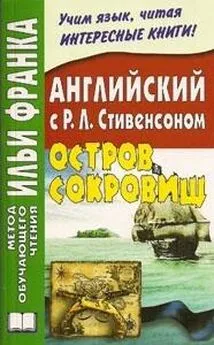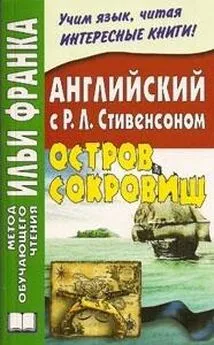Илья Франк - Английский язык с Р.Л. Стивенсоном. Остров сокровищ
- Название:Английский язык с Р.Л. Стивенсоном. Остров сокровищ
- Автор:
- Жанр:
- Издательство:неизвестно
- Год:неизвестен
- ISBN:нет данных
- Рейтинг:
- Избранное:Добавить в избранное
-
Отзывы:
-
Ваша оценка:
Илья Франк - Английский язык с Р.Л. Стивенсоном. Остров сокровищ краткое содержание
Английский язык с Р.Л. Стивенсоном. Остров сокровищ - читать онлайн бесплатно ознакомительный отрывок
Интервал:
Закладка:
шрамом на щеке), and his old brass telescope (и своей старой медной
Мультиязыковой проект Ильи Франка www.franklang.ru
163
подзорной трубой). Next moment we had turned the corner (через миг мы
свернули за угол), and my home was out of sight (и мой дом исчез из поля
зрения).
clumsy [`klAmzI] opportunities [Opq`tjHnItIz] corner [`kLnq] sight [saIt]
1. It was on seeing that boy that I understood, for the first time, my situation.
I had thought up to that moment of the adventures before me, not at all of the
home that I was leaving; and now, at the sight of this clumsy stranger, who
was to stay here in my place beside my mother, I had my first attack of tears.
I am afraid I led that boy a dog's life; for as he was new to the work, I had a
hundred opportunities of setting him right and putting him down, and I was
not slow to profit by them.
2. The night passed, and the next day, after dinner, Redruth and I were afoot
again, and on the road. I said good-bye to mother and the cove where I had
lived since I was born, and the dear old 'Admiral Benbow' — since he was
repainted, no longer quite so dear. One of my last thoughts was of the captain,
who had so often strode along the beach with his cocked hat, his sabre-cut
cheek, and his old brass telescope. Next moment we had turned the corner,
and my home was out of sight.
1. The mail picked us up about dusk at the 'Royal George' on the heath (почтовый
дилижанс подобрал нас, когда уже почти стемнело, у /гостиницы/ «Король
Георг», на пустоши). I was wedged in between Redruth and stout old gentleman
(меня втиснули между Редрутом и коренастым пожилым джентльменом; to
wedge in — вклинивать, втискивать; wedge — клин ), and in spite of the swift
Мультиязыковой проект Ильи Франка www.franklang.ru
164
motion and the cold night air (и несмотря на быструю езду и холодный ночной
воздух), I must have dozed a great deal from the very first (я, должно быть,
надолго заснул с самого начала = сразу же; to doze — дремать, забываться; a
great deal — много ), and then slept like a log up hill and down dale through stage
after stage (и затем спал, как сурок: «чурбан», /пока мы мчались/ по горам, по
долам, от станции до станции; dale — долина, поле ); for when I was awakened
at last (так как когда я был разбужен наконец), it was by a punch in the ribs (это
было ударом в ребра), and I opened my eyes to find that we were standing still
before a large building in a city street (я открыл глаза, чтобы обнаружить = и
увидел, что мы стоим /неподвижно/ = что мы остановились перед большим
зданием на городской улице), and that the day had already broken long time (и
что «день уже пробился давно» = давно рассвело).
2. 'Where are we (где мы)?' I asked.
3. 'Bristol,' said Tom. 'Get down (вылезай).'
heath [hJT] stout [staut] dozed [dquzd] punch [pAntS] building [`bIldIN]
1. The mail picked us up about dusk at the 'Royal George' on the heath. I was
wedged in between Redruth and stout old gentleman, and in spite of the swift
motion and the cold night air, I must have dozed a great deal from the very
first, and then slept like a log up hill and down dale through stage after stage;
for when I was awakened at last, it was by a punch in the ribs, and I opened
my eyes to find that we were standing still before a large building in a city
street, and that the day had already broken long time.
2. 'Where are we?' I asked.
Мультиязыковой проект Ильи Франка www.franklang.ru
165
3. 'Bristol,' said Tom. 'Get down.'
Mr. Trelawney had taken up his residence at an inn far down the docks (мистер
Трелони выбрал себе место жительства = поселился в трактире, возле доков;
to take up — брать, занимать ), to superintend the work upon the schooner
(чтобы руководить работой на шхуне; to superintend — управлять,
наблюдать ). Thither we had now to walk (туда мы должны были теперь
пойти), and our way, to my great delight (и наш путь, к моей великой радости),
lay along the quays and beside the great multitude of ships of all sizes and rigs and
nations (лежал вдоль причалов и рядом с = мимо огромного множества
кораблей всех размеров, оснасток и наций). In one sailors were singing at their
work (на одном матросы пели за работой); in another, there were men aloft high
over my head (на другом — люди высоко висели над моей головой; aloft —
наверху, в высоте ), hanging to threads that seemed no thicker than a spider's
(болтаясь на нитях, которые казались не толще паутинок; spider — паук ).
Though I had lived by the shore all my life (хотя я всю жизнь жил на
побережье), I seemed never to have been near the sea till then (казалось, что я
никогда до этого не был рядом с морем = словно видел его теперь впервые).
The smell of tar and salt was something new (запах дегтя и соли был чем-то
новым /для меня/). I saw the most wonderful figureheads (я видел великолепные
фигуры на носах кораблей), that had all been far over the ocean (которые все
побывали за океаном = в дальних плаваниях; far — далеко ). I saw, besides,
many old sailors (я видел, помимо того, множество старых моряков), with rings
in their ears, and whiskers curled in ringlets (с серьгами в ушах и бакенбардами,
завитыми в колечки), and tarry pigtails, and their swaggering, clumsy sea-walk (с
просмоленными косичками, и их качающейся, неуклюжей морской
походкой); and if I had seen as many kings or archbishops I could not have been
more delighted (и если бы я увидел столько же королей или архиепископов, я
не был бы восхищен более).
Мультиязыковой проект Ильи Франка www.franklang.ru
166
residence [`rezIdqns] superintend [sjHpqrIn`tend] quays [kJz] archbishop
[RtS`bISqp]
Mr. Trelawney had taken up his residence at an inn far down the docks, to
superintend the work upon the schooner. Thither we had now to walk, and
our way, to my great delight, lay along the quays and beside the great
multitude of ships of all sizes and rigs and nations. In one sailors were singing
at their work; in another, there were men aloft high over my head, hanging to
threads that seemed no thicker than a spider's. Though I had lived by the
shore all my life, I seemed never to have been near the sea till then. The smell
of tar and salt was something new. I saw the most wonderful figureheads, that
had all been far over the ocean. I saw, besides, many old sailors, with rings in
their ears, and whiskers curled in ringlets, and tarry pigtails, and their
swaggering, clumsy sea-walk; and if I had seen as many kings or archbishops
I could not have been more delighted.
1. And I was going to sea myself (и я сам собирался /отправиться/ в море); to
sea in a schooner, with a piping boatswain, and pig-tailed singing seamen (выйти в
море на шхуне, с насвистывающим /сигналы на дудке/ боцманом, и
носящими косички и поющими матросами; pig-tail — косичка: «свиной
хвостик»— волосы или парик, заплетенные и убранные назад ); to sea, bound
for an unknown island (в море, направляясь к неведомому острову), and to seek
for buried treasures (искать зарытые сокровища)!
2. While I was still in this delightful dream (пока я все еще был /погружен/ в эту
восхитительную мечту; delight — удовлетворение, удовольствие,
Мультиязыковой проект Ильи Франка www.franklang.ru
167
наслаждение, развлечение ), we came suddenly in front of a large inn, and met
Squire Trelawney (мы дошли внезапно до большого трактира, и встретили
сквайра Трелони; in front of — перед, спереди ), all dressed out like a sea-officer
(/который был/ весь наряженный как морской офицер), in stout blue cloth (в
плотную синюю ткань = мундир), coming out of the door with a smile on his
face (выходя из двери с улыбкой на лице), and a capital imitation of a sailor's
walk (и с превосходным подражанием матросской походке).
3. 'Here you are (вот и вы),' he cried, 'and the doctor came last night from London
(а доктор прибыл прошлым вечером из Лондона). Bravo (браво)! the ship's
company complete (/теперь/ вся команда корабля в сборе; complete —
полный )!'
4. 'Oh, sir,' cried I, 'when do we sail (когда мы отплываем)?'
5. 'Sail!' says he. 'We sail to-morrow (отплываем завтра)!'
schooner [`skHnq] buried [`berId] cloth [klOT] complete [kqm`plJt]
Читать дальшеИнтервал:
Закладка:


